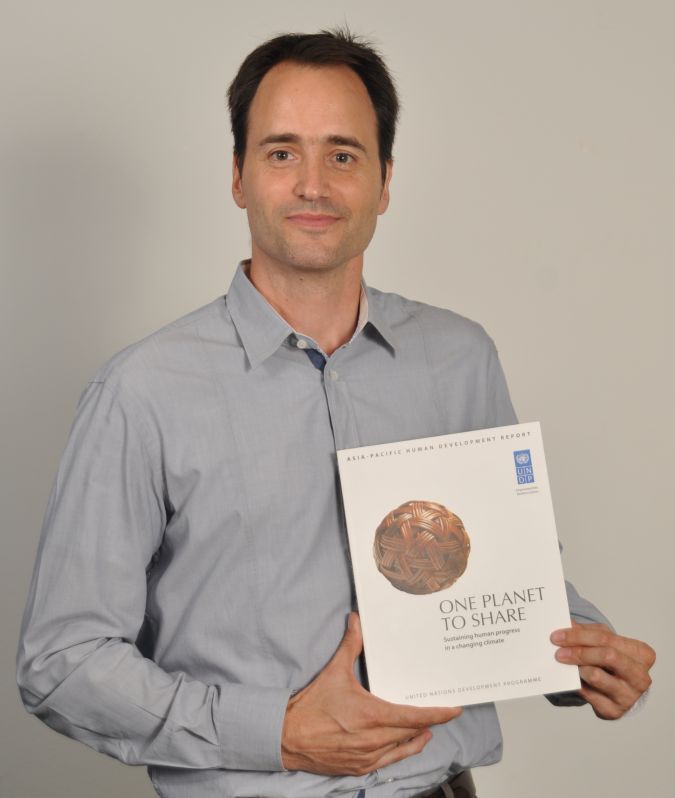Less than one year after joining AIT, Natural Resources Management
field of study Assistant Professor Clemens Grunbuhel has made a mark in
academic circles by contributing to one of the region’s most
authoritative reports on the state of human development.
In the Asia-Pacific Human Development Report 2012, published by the
United Nations Development Programme, Dr. Grunbuhel is one of the
principal contributors of technical background papers. The publication
released in May was aimed at reinvigorating climate change dialogue by
bringing people’s concerns into the fore ahead of the Rio +20
Conference.
This year’s report titled “One Planet to Share: Sustaining Human
Progress in a Changing Climate” examines the consequences of the
anthropocene era or so-called “Age of Man” on Asia, “in which the sheer
scale of human activities is not only transforming the natural
environment, but also changing how it functions and interacts with
people.”
The biennial publication is the culmination of numerous regional
technical and stakeholder meetings and consultations with leading
experts. All submissions were carefully evaluated through an extensive
peer review process.
Across its six chapters, the report is unequivocal that the
unprecedented pace and scale of human activities have been transforming
the natural environment and contributing to climate change.
Asia-Pacific, the report notes, not only has many of the world’s most
climate-exposed territories, it is also home to millions of the most
vulnerable people. And while the most vulnerable people in Asia have
contributed little to greenhouse gas (GHG) emissions, they will face
some of the most serious consequences as temperatures continue to
rise.
Also rising are oceans, which threaten low lying coastal areas now
home to tens of millions. Currently there are eleven mega-deltas formed
by rivers originating from the Tibetan Plateau. According to the
Intergovernmental Panel on Climate Change (IPCC), two of these, the
Ganges-Brahmaputra and the Mekong River mega-deltas, are at very high
risk.
Exploring the adaptive capacity of vulnerable rural communities in
both regions, in particular the deltaic communities living along their
river systems, is at the heart of Dr. Grunbuhel’s research included in
the UNDP publication. In a pair of case studies, he examines endangered
livelihoods and multi-scale climate change adaptation strategies of
farming communities in Bangladesh and Cambodia.
A case in point are the fertile floodplains of the Ganges River delta
where seawater encroaching onto rice paddy lands has forced a chain
reaction of maladaptation that is fundamentally altering peoples’
lives, Dr. Grunbuhel says.
His study focused on the southern tip of the delta in a region of
Khulna province, Bangladesh called Sunderban, which is home to South
Asia's largest mangrove forest.
As soil salinities increased, some farmers switched from rice
cultivation to saltwater shrimp. This, however, exacerbated the
salinity issue and pushed the entire region out of rice farming which,
in turn, put famers' livelihoods at risk. In an attempt to backtrack,
new farming techniques are now being tested, such as switching to
freshwater prawn or adopting a rice-fish system.
“Moving to shrimp production has had a profound impact on farmers’
abilities to feed themselves, and increased vulnerability owing to new
dependency on shrimp markets.” Promoting a more balanced rice-fish
system for small-scale farmers would be a more sustainable option, Dr.
Grunbuhel recommends.
Dr. Grunbuhel’s writings also come through in chapter four titled
“Raising Rural Resilience.” In Asia and the Pacific, it notes, nearly
700 million people in rural areas live in extreme poverty and are
exposed to a wide range of climate change impacts — from flash floods
in mountain areas, to sea-level rises in river delta regions.
Though Cambodian rice farmers have yet to experience noticeable
impacts from climate change, they are experiencing new forms of
economic dependency to middlemen, the School of Resources, Environment
and Development academic argues.
A common denominator for both countries is that they are highly
exposed and sensitive to climate events, and lack adequate adaptive
capacity, Dr. Grunbuhel emphasizes. Each is also at risk to new forms
of dependency that limit rural dwellers’ abilities to cope sustainably
with economic, social and technological transformations.
A native of Austria, Dr. Grunbuhel earned a Dr. Phil in 2004 from the
University of Vienna. Prior to joining AIT in 2011, he worked at CSIRO
(Commonwealth Scientific and Industrial Research Organisation), which
is Australia's national science agency.
The Asia-Pacific Human Development Report 2012 can
be read at this
link.
AIT faculty members have previously made contributions to the UNDP
Asia-Pacific Human Development Report. In 2010, Associate Professor
Bernadette P. Resurreccion of the Gender and Development
Studies field of study, School of Environment, Resources and
Development, was one of the principal contributors to the
report.
Read the 2010 Report:
http://hdr.undp.org/en/reports/regional/asiathepacific/name,3441,en.html
Read the full version of Dr. Resurreccion's technical
paper.
http://www.snap-undp.org/elibrary/Publication.aspx?ID=624.

